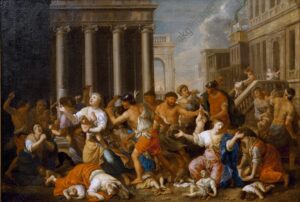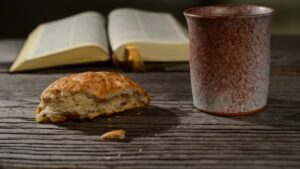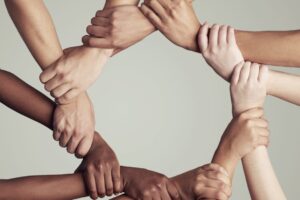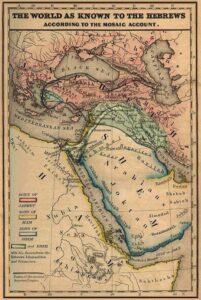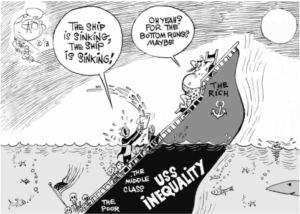Below is the text of both the letter from eight white Birmingham clergy (Christians and Jews) who chastised Martin Luther King Jr. for his direct action campaign in their city and the “Letter from a Birmingham Jail” penned in response by MLK to these fellow clergymen.
ALABAMA CLERGYMEN’S LETTER TO DR. MARTIN LUTHER KING, JR. [THE FOLLOWING IS A VERBATIM COPY OF THE PUBLIC STATEMENT DIRECTED TO MARTIN LUTHER KING, JR. BY EIGHT ALABAMA CLERGYMEN, WHICH OCCASIONED HIS REPLY.] April 12, 1963
We the undersigned clergymen are among those who in January, issued “An Appeal for Law and Order and Common Sense,” in dealing with racial problems in Alabama. We expressed understanding that honest convictions in racial matters could properly be pursued in the courts but urged that decisions of those courts should in the meantime be peacefully obeyed.
Since that time there had been some evidence of increased forbearance and a willingness to face facts. Responsible citizens have undertaken to work on various problems which caused racial friction and unrest. In Birmingham, recent public events have given indication that we all have opportunity for a new constructive and realistic approach to racial problems.
However, we are now confronted by a series of demonstrations by some of our Negro citizens directed and led in part by outsiders. We recognize the natural impatience of people who feel that their hopes are slow in being realized. But we are convinced that these demonstrations are unwise and untimely.
We agree rather with certain local Negro leadership which has called for honest and open negotiation of racial issues in our area. And we believe this kind of facing of issues can best be accomplished by citizens of our own metropolitan area white and Negro, meeting with their knowledge and experience of the local situation. All of us need to face that responsibility and find proper channels for its accomplishment. Just as we formerly pointed out that “hatred and violence have no sanction in our religious and political tradition.” We also point out that such actions as incite to hatred and violence, however technically peaceful those actions may be, have not contributed to the resolution of our local problems. We do not believe that these days of new hope are days when extreme measures are justified in Birmingham.
We commend the community as a whole and the local news media and law enforcement officials in particular, on the calm manner in which these demonstrations have been handled. We urge the public to continue to show restraint should the demonstrations continue, and the law enforcement officials to remain calm and continue to protect our city from violence.
We further strongly urge our own Negro community to withdraw support from these demonstrations, and to unite locally in working peacefully for a better Birmingham. When rights are consistently denied, a cause should be pressed in the courts and in negotiations among local leaders, and not in the streets. We appeal to both our white and Negro citizenry to observe the principles of law and order and common sense.
Signed by: C. C. J. CARPENTER, D.D., LL.D. Bishop of Alabama JOSEPH A. DURICK, D.D. Auxiliary Bishop. Diocese of Mobile-Birmingham Rabbi HILTON J. GRAFMAN, Temple Emmanu-El, Birmingham, Alabama Bishop PAUL HARDIN, Bishop of the Alabama-West Florida Conference of the Methodist Church. Bishop HOLAN B. HARMON, Bishop of the North Alabama Conference of the Methodist Church GEORGE M. MURRAY, Bishop Coadjutor, Episcopal Diocese of Alabama EDWARD V. RAMSAGE, Moderator, Synod of the Alabama Presbyterian Church in the United States EARL STALLINGS, Pastor, First Baptist Church, Birmingham, Alabama.
Letter From Birmingham City Jail – Dr. Martin Luther King, Jr.
April 16, 1963
My Dear Fellow Clergymen, While confined here in the Birmingham City Jail, I came across your recent statement calling our present activities “unwise and untimely.” Seldom, if ever, do I pause to answer criticism of my work and ideas…But since I feel that you are men of genuine good will and your criticisms are sincerely set forth, I would like to answer your statement in what I hope will be patient and reasonable terms. (1)
I think I should give the reason for my being in Birmingham, since you have been influenced by the argument of “outsiders coming in.” I have the honor of serving as president of the Southern Christian Leadership Conference, an organization operating in every Southern state with headquarters in Atlanta, Georgia. We have some 85 affiliate organizations all across the South…Several months ago our local affiliate here in Birmingham invited us to be on call to engage in a nonviolent direct action program if such were deemed necessary. We readily consented, and when the hour came we lived up to our promises. So I am here, along with several members of my staff, because I have basic organizational ties here. Beyond this, I am in Birmingham because injustice is here. Just as the eighth century prophets left their little villages and carried their “thus saith the Lord” far beyond the boundaries of their home towns; and just as the Apostle Paul left his little village of Tarsus and carried the gospel of Jesus Christ to practically every hamlet and city of the Graeco-Roman world, I too am compelled to carry the gospel of freedom beyond my particular home town. Like Paul, I must constantly respond to the Macedonian call for aid. (2)
Moreover, I am cognizant of the interrelatedness of all communities and states. I cannot sit idly by in Atlanta and not be concerned about what happens in Birmingham. Injustice anywhere is a threat to justice everywhere. We are caught in an inescapable network of mutuality, tied in a single garment of destiny. Whatever affects one directly affects all indirectly. Never again can we afford to live with the narrow, provincial “outside agitator” idea. Anyone who lives inside the United States can never be considered an outsider anywhere in this country. (3)
In any nonviolent campaign there are four basic steps: 1) collection of the facts to determine whether injustices are alive; 2) negotiation; 3) self-purification; and 4) direct action. We have gone through all of these steps in Birmingham…Birmingham is probably the most thoroughly segregated city in the United States. Its ugly record of police brutality is known in every section of the country. Its unjust treatment of Negroes in the courts is a notorious reality. There have been more unsolved bombings of Negro homes and churches in Birmingham than in any city in this nation. These are the hard, brutal, and unbelievable facts. On the basis of these conditions Negro leaders sought to negotiate with the city fathers. But the political leaders consistently refused to engage in good faith negotiation. (4) Then came the opportunity last September to talk with some of the leaders of the economic community. In these negotiating sessions certain promises were made by the merchants – such as the promise to remove the humiliating racial signs from the stores. On the basis of these promises Reverend Shuttlesworth and the leaders of the Alabama Christian Movement for Human Rights agreed to call a moratorium on any type of demonstrations. As the weeks and months unfolded we realized that we were the victims of a broken promise. A few signs, briefly removed, returned; the others remained. (5)
As in so many experiences in the past, we were confronted with blasted hopes, and the dark shadow of a deep disappointment settled upon us. So we had no alternative except that of preparing for direct action, whereby we would present our very bodies as a means of laying our case before the conscience of the local and national community. Mindful of the difficulties involved, we decided to undertake a process of selfpurification. We began a series of workshops on nonviolence, and we repeatedly asked ourselves: “Are you able to accept the blows without retaliating?” “Are you able to endure the ordeals of jail?” We decided to schedule our direct-action program for the Easter season, realizing that except for Christmas, this is the main shopping period of the year. Knowing that a strong economic with with-drawl program would be the byproduct of direct action, we felt that this would be the best time to bring pressure to bear on the merchants for the needed change. … (6)
You may well ask, “Why direct action? Why sit-ins, marches, etc.? Isn’t negotiation a better path?” You are exactly right in your call for negotiation. Indeed, this is the purpose of direct action. Nonviolent direct action seeks to create such a crisis and establish such creative tension that a community that has constantly refused to negotiate is forced to confront the issue. It seeks so to dramatize the issue so that it can no longer be ignored. My citing the creation of tension as part of the work of the nonviolent-resister may sound rather shocking, but I must confess that I am not afraid of the word “tension.” I have earnestly opposed violent tension, but there is a type of constructive, nonviolent tension which is necessary for growth. … The purpose of our direct action program is to create a situation so crises-packed that it will inevitably open the door to negotiation. (7)
My friends, I must say to you that we have not made a single gain in civil rights without legal and nonviolent pressure. History is the long and tragic story of the fact that privileged groups seldom give up their privileges voluntarily. Individuals may see the moral light and give up their unjust posture; but as Reinhold Niebuhr has reminded us, groups are more immoral than individuals. (8)
We know through painful experience that freedom is never voluntarily given by the oppressor; it must be demanded by the oppressed. Frankly, I have yet to engage in a direct action movement that was “well timed,” according to the timetable of those who have not suffered unduly from the disease of segregation. For years now I have heard the word “Wait!” It rings in the ear of every Negro with a piercing familiarity. This “Wait” has almost always meant “Never.” It has been a tranquilizing Thalidomide, relieving the emotional stress for a moment, only to give birth to an ill-formed infant of frustration. We must come to see with the distinguished jurist of yesterday that “justice too long delayed is justice denied.” (9)
We have waited for more than 340 years for our constitutional and God-given rights. The nations of Asia and Africa are moving with jet-like speed toward the goal of political independence, and we still creep at horse and buggy pace toward the gaining of a cup of coffee at a lunch counter. I guess it is easy for those who have never felt the stinging darts of segregation to say wait. But when you have seen vicious mobs lynch your mothers and fathers at will and drown your sisters and brothers at whim; when you have seen hate-filled policemen curse, kick, brutalize, and even kill your black brothers and sisters with impunity; when you see the vast majority of your 20 million Negro brothers smothering in an airtight cage of poverty in the midst of an affluent society; when you suddenly find your tongue twisted and your speech stammering as you seek to explain to your six-year-old daughter why she can’t go to the public amusement park that has just been advertised on television, and see the tears welling up in her little eyes when she is told that Funtown is closed to colored children, and see the depressing clouds of inferiority begin to form in her little mental sky, and see her begin to distort her little personality by unconsciously developing a bitterness toward white people; when you have to concoct an answer for a five-year-old son who is asking in agonizing pathos: “Daddy, why do white people treat colored people so mean?”; when you take a cross country drive and find it necessary to sleep night after night in the uncomfortable corners of your automobile because no motel will accept you; when you are humiliated day in and day out by nagging signs reading “white” men and “colored”; when your first name becomes “nigger” and your middle name becomes “boy” (however old you are) and your last name becomes “John,” and when your wife and mother are never given the respected title of “Mrs.”; when you are harried by day and haunted by night by the fact that you are a Negro, living constantly at tip-toe stance, never quite knowing what to expect next, and plagued with inner fears and outer resentments; when you are forever fighting a degenerating sense of “nobodiness”-then you will understand why we find it difficult to wait. There comes a time when the cup of endurance runs over, and men are no longer willing to be plunged into an abyss of injustice where they experience the bleakness of corroding despair. I hope, sirs, you can understand our legitimate and unavoidable impatience. (10)
You express a great deal of anxiety over our willingness to break laws. This is certainly a legitimate concern. Since we so diligently urge people to obey the Supreme Court’s decision of 1954 outlawing segregation in the public schools, it is rather strange and paradoxical to find us consciously breaking laws. One may well ask: “How can you advocate breaking some laws and obeying others?” The answer is found in the fact that there are two types of laws: There are just and there are unjust laws. I would agree with Saint Augustine that “An unjust law is no law at all.” (11)
Now, what is the difference between the two? How does one determine when a law is just or unjust? A just law is a man-made code that squares with the moral law or the law of God. An unjust law is a code that is out of harmony with the moral law. To put it in the terms of Saint Thomas Aquinas, an unjust law is a human law that is not rooted in eternal and natural law. Any law that uplifts human personality is just. Any law that degrades human personality is unjust. All segregation statutes are unjust because segregation distorts the soul and damages the personality. It gives the segregator a false sense of superiority, and the segregated a false sense of inferiority. To use the words of Martin Buber, the Jewish philosopher, segregation substitutes and “I-it” relationship for an “I-thou” relationship, and ends up relegating persons to the status of things. So segregation is not only politically, economically and sociologically unsound, but it is morally wrong and sinful. Paul Tillich has said that sin is separation. Isn’t segregation an existential expression of man’s tragic separation, an expression of his awful estrangement, his terrible sinfulness? So I can urge men to disobey segregation ordinances because they are morally wrong. (12)
Let us turn to a more concrete example of just and unjust laws. An unjust law is a code that a majority inflicts on a minority that is not binding on itself. This is difference made legal. On the other hand a just law is a code that a majority compels a minority to follow that it is willing to follow itself. This is sameness made legal. (13)
Let me give another explanation. An unjust law is a code inflicted upon a minority which that minority had no part in enacting or creating because they did not have the unhampered right to vote. Who can say that the legislature of Alabama which set up the segregation laws was democratically elected? Throughout the state of Alabama all types of conniving methods are used to prevent Negroes from becoming registered voters and there are some counties without a single Negro registered to vote despite the fact that the Negro constitutes a majority of the population. Can any law set up in such a state be considered democratically structured? (14)
These are just a few examples of unjust and just laws. There are some instances when a law is just on its face and unjust in its application. For instance, I was arrested Friday on a charge of parading without a permit. Now there is nothing wrong with an ordinance which requires a permit for a parade, but when the ordinance is used to preserve segregation and to deny citizens the First-Amendment privilege of peaceful assembly and peaceful protest, then it becomes unjust. (15)
I hope you can see the distinction I am trying to point out. In no sense do I advocate evading or defying the law as the rabid segregationist would do. This would lead to anarchy. One who breaks an unjust law must do it openly, lovingly, (not hatefully as the white mothers did in New Orleans when they were seen on television screaming “nigger, nigger, nigger”) and with a willingness to accept the penalty. I submit that an individual who breaks a law that conscience tells him is unjust, and willingly accepts the penalty by staying in jail to arouse the conscience of the community over its injustice, is in reality expressing the very highest respect for law. (16)
Of course, there is nothing new about this kind of civil disobedience. It was seen sublimely in the refusal of Shadrach, Meshach and Abednego to obey the laws of Nebuchadnezzar because a higher moral law was involved. It was practiced superbly by the early Christians who were willing to face hungry lions and the excruciating pain of chopping blocks, before submitting to certain unjust laws of the Roman Empire. To a degree academic freedom is a reality today because Socrates practiced civil disobedience. … (17)
I must make two honest confessions to you, my Christian and Jewish brothers. First, I must confess that over the last few years I have been gravely disappointed with the white moderate. I have almost reached the regrettable conclusion that the Negro’s great stumbling block in the stride toward freedom is not the White citizens’ “Councilor” or the Ku Klux Klanner, but the white moderate who is more devoted to “order” than to justice; who prefers a negative peace which is the absence of tension to a positive peace which is the presence of justice; who constantly says “I agree with you in the goal you seek, but I can’t agree with your methods of direst action”; who paternalistically feels that he can set the timetable for another man’s freedom; who lives by the myth of time and who constantly advises the Negro to wait until a “more convenient season.” Shallow understanding from people of good will is more frustrating than absolute misunderstanding from people of ill will. Lukewarm acceptance is much more bewildering than outright rejection. … (18)
You spoke of our activity in Birmingham as extreme. At first I was rather disappointed that fellow clergymen would see my nonviolent efforts as those of an extremist. I started thinking about the fact that I stand in the middle of two opposing forces in the Negro community. One is a force of complacency made up of Negroes who, as a result of long years of oppression, have been so completely drained of self-respect and a sense of “somebodiness” that they have adjusted to segregation, and a few Negroes in the middle class who, because of a degree of academic and economic security, and at points they profit from segregation, have unconsciously become insensitive to the problems of the masses. The other force is one of bitterness and hatred and comes perilously close to advocating violence. It is expressed in the various black nationalist groups that are springing up over the nation, the largest and best known being Elijah Muhammad’s Muslim movement. This movement is nourished by the contemporary frustration over the continued existence of racial discrimination. It is made up of people who have lost faith in America, who have absolutely repudiated Christianity, and who have concluded that the white man in an incurable “devil.”… (19)
Oppressed people cannot remain oppressed forever. The urge for freedom will eventually come. This is what happened to the American Negro. Something within has reminded him of his birthright of freedom; something without has reminded him that he can gain it. Consciously and unconsciously, he has been swept in by what the Germans call the Zeitgeist, and with his black brothers of Africa, and his brown and yellow brothers of Asia, South America and the Caribbean, he is moving with a sense of cosmic urgency toward the promised land of racial justice. (20)
Recognizing this vital urge that has engulfed the Negro community, one should readily understand public demonstrations. The Negro has many pent-up resentments and latent frustrations. He has to get them out. So let him march sometime; let him have his prayer pilgrimages to the city hall; understand why he must have sit-ins and freedom rides. If his repressed emotions do not come out in these nonviolent ways, they will come out in ominous expressions of violence. This is not a threat; it is a fact of history. So I have not said to my people, “Get rid of your discontent.” But I have tried to say that this normal and healthy discontent can be channeled through the creative outlet of nonviolent direct action. … (21)
In spite of my shattered dreams of the past, I came to Birmingham with the hope that the white religious leadership in the community would see the justice of our cause and, with deep moral concern, serve as the channel through which our just grievances could get to the power structure. I had hoped that each of you would understand. But again I have been disappointed. (22)
I have heard numerous religious leaders of the South call upon their worshippers to comply with a desegregation decision because it is the law, but I have longed to hear white ministers say follow this decree because integration is morally right and the Negro is your brother. In the midst of blatant injustices inflicted upon the Negro, I have watched white churches stand on the sideline and merely mouth pious irrelevancies and sanctimonious trivialities. In the midst of a mighty struggle to rid our nation of racial and economic injustice, I have heard so many ministers say, “Those are social issues with which the Gospel has no real concern,” and I have watched so many churches commit themselves to a completely other-worldly religion which made a strange distinction between body and soul, the sacred and the secular. (23)
So here we are moving toward the exit of the twentieth century with a religious community largely adjusted to the status quo, standing as a tail-light behind other community agencies rather than a headlight leading men to higher levels of justice. (24)
I have traveled the length and breadth of Alabama, Mississippi and all the other southern states. On sweltering summer days and crisp autumn mornings I have looked at her beautiful churches with their lofty spires pointing heavenward. I have beheld the impressive outlay of her massive religious education buildings. Over and over again I have found myself asking: “What kind of people worship here? Who is their God? Where were their voices when the lips of Governor Barnett dripped with words of interposition and nullification? Where were they when Governor Wallace gave the clarion call for defiance and hatred? Where were their voices of support when tired, bruised and weary Negro men and women decided to rise from the dark dungeons of complacency to the bright hills of creative protest?” … (25)
Yes, these questions are still in my mind. In deep disappointment, I have wept over the laxity of the church. But be assured that my tears have been tears of love. There can be no deep disappointment where there is not deep love. Yes, I love the church; I love her sacred walls. How could I do otherwise? I am in the rather unique position of being the son, the grandson and the great-grandson of preachers. Yes, I see the church as the body of Christ. But, oh! How we have blemished and scarred that body through social neglect and fear of being nonconformists. (26)
There was a time when the church was very powerful. It was during that period when the early Christians rejoiced when they were deemed worthy to suffer for what they believed. In those days the church was not merely a thermometer that recorded the ideas and principles of popular opinion; it was a thermostat that transformed the mores of society. Whenever the early Christians entered a town the power structure got disturbed and immediately sought to convict them for being “disturbers of the peace” and “outside agitators.” But they went on with the conviction that they were “a colony of heaven,” and had to obey God rather than man. They were small in number but big in commitment. They were too God-intoxicated to be “astronomically intimidated.” They brought an end to such ancient evils as infanticide and gladiatorial contest. (27)
I hope this letter finds you strong in the faith. I also hope that circumstances will soon make it possible for me to meet each of you, not as an integrationist or a civil rights leader, but as a fellow clergyman and a Christian brother. Let us all hope that the dark clouds of racial prejudice will soon pass away and the deep fog of misunderstanding will be lifted from our fear-drenched communities and in some not too distant tomorrow the radiant stars of love and brotherhood will shine over our great nation with all of their scintillating beauty. (28)
Yours for the cause of Peace and Brotherhood,
M. L. King, Jr.
